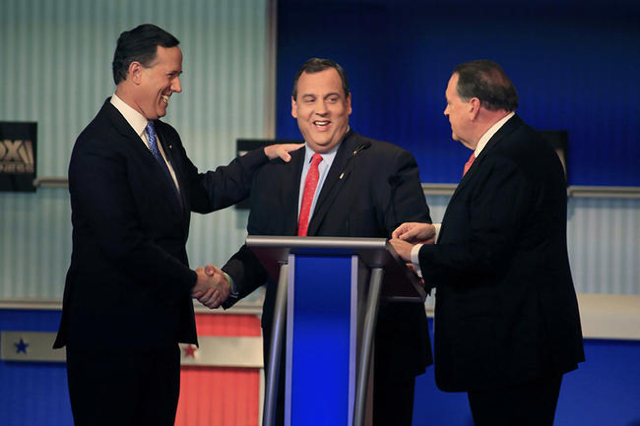Some familiar-sounding notes in Republican debate
If you follow politics long enough, you'll eventually see everything.
For example, this: "The American people feel like the tax code is rigged for the rich. You know why they feel that way? Because it is."
Who said it? Massachusetts U.S. Sen. Elizabeth Warren? Vermont U.S. Sen. Bernie Sanders? Former Maryland Gov. Martin O'Malley? Surely not ex-Secretary of State Hillary Clinton?
Wrong on all counts: That was New Jersey Gov. Chris Christie, during the Republican undercard debate on Fox Business Channel on Wednesday.
How about this: "The middle of America is hollowing out."
That's got to be Sanders or Clinton, both of whom have made lifting the middle class one of the central themes of their presidential campaigns.
Nope. It was former Pennsylvania U.S. Sen. Rick Santorum.
Try this one, spoken in response to a question about raising the minimum wage: "To just look the other way is not acceptable."
Clinton? Nope. Try Republican Ohio Gov. John Kasich.
Another: The current tax system is corrupt and it empowers the Washington cartel. That must be Warren, who feels about big banks the way U.S. Sen. Ted Cruz of Texas feels about socialists.
Nope. That was actually Cruz, who later in the Republican debate suggested that he would prosecute Wall Street wrongdoers and refuse to bail out the big banks if there was another financial crisis.
Here's a good one: "I'll tell you about Wall Street. There's too much greed. And the fact is, a free enterprise system is a system that's produced the greatest wealth to the world. ... They need a good ethics lesson on Wall Street on a regular basis to keep them in check so the people do not lose."
Greed? Wall Street? Somebody's got to be feeling the Bern.
Nope. Kasich again. And when Cruz said he'd let the big banks fail (or at least force them to take an interest-bearing loan from the Federal Reserve), it was Kasich who lectured, "philosophy doesn't work when you run something." In other words, when you're responsible for the fate of people's life savings, you can't just quote Ayn Rand.
Never fear, there were still plenty of Republican moments during the debate.
Louisiana Gov. Bobby Jindal warned that America is on the path to socialism, and government spending must be cut in order for the private sector to grow. Kentucky U.S. Sen. Rand Paul lectured Florida U.S. Sen. Marco Rubio about conservatism, saying the definition excluded spending an additional $1 trillion on defense not offset by cuts elsewhere. (That forced Rubio to fall back on American greatness, saying "No, no, I don't believe — I know — the world is a safer and better place when America is the strongest military power in the world." Cheers!)
Despite the random populism that garnished the Republican debate talking points, none of the candidates has put forward a plan that would, say, increase wages for the hollowed-out middle, make it easier for their kids to attend college in order to get better, higher-paying jobs, or help provide affordable child care that would enable many women to join the workforce.
Sure, there were a few moments when Republicans surprisingly sounded like Democrats, which shows even the party of trickle-down may be slowly realizing that the growing wealth gap is a serious and unsustainable thing.
All right, one last quote, regarding the fallout from the 2008 financial crisis: "People today are very alienated, not feeling good about Washington, I think that this is one of the reasons. They saw a major crime being perpetrated, and nothing happens to the big guys. And yet people do small crimes, and they get thrown in jail."
OK, that one actually was Bernie Sanders.
—Steve Sebelius is a Las Vegas Review-Journal political columnist and co-host of the show "PoliticsNOW," airing at 5:30 p.m. Sundays on 8NewsNow. Follow him on Twitter (@SteveSebelius) or reach him at 702-387-5276 or ssebelius@reviewjournal.com.






















